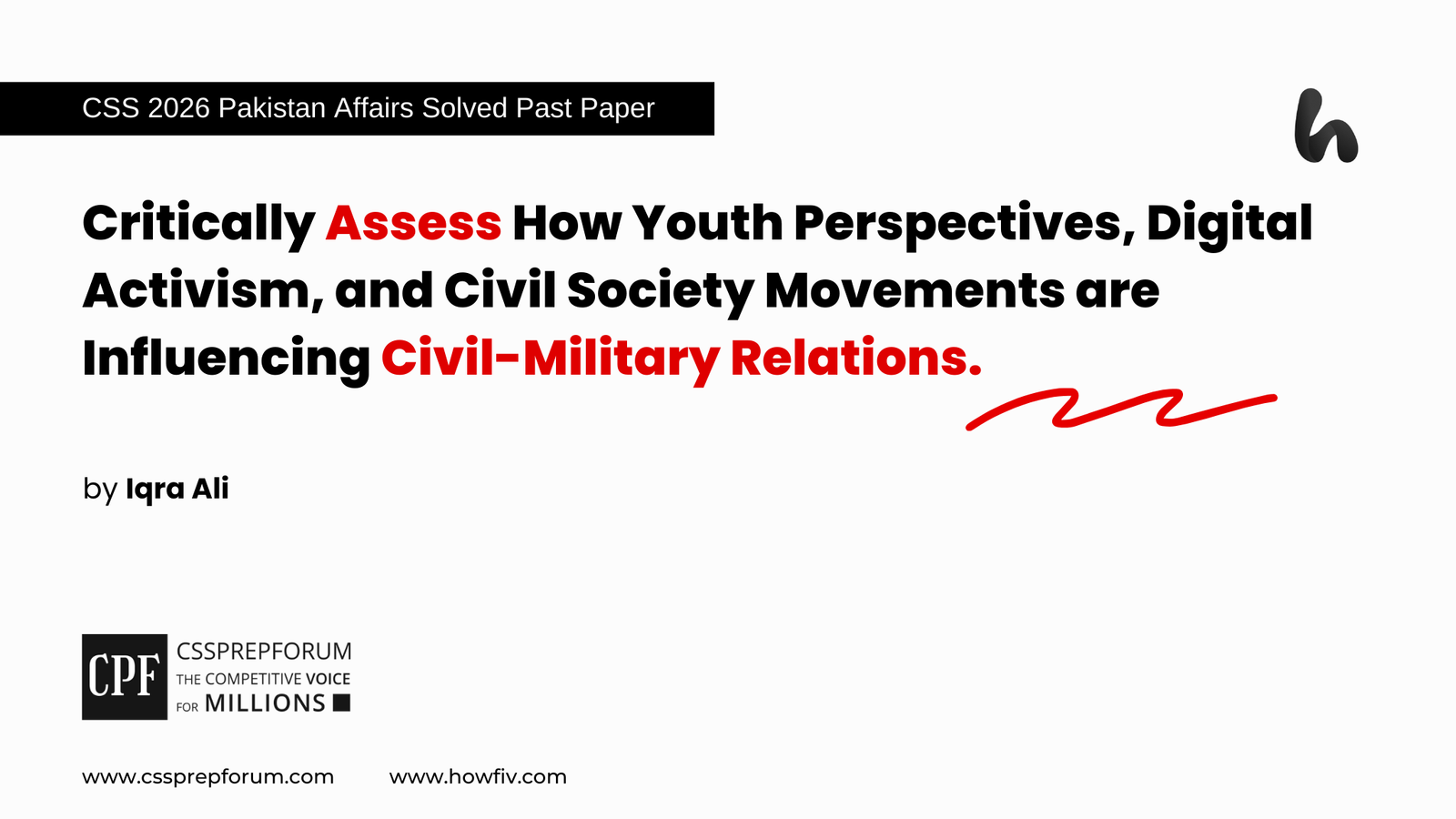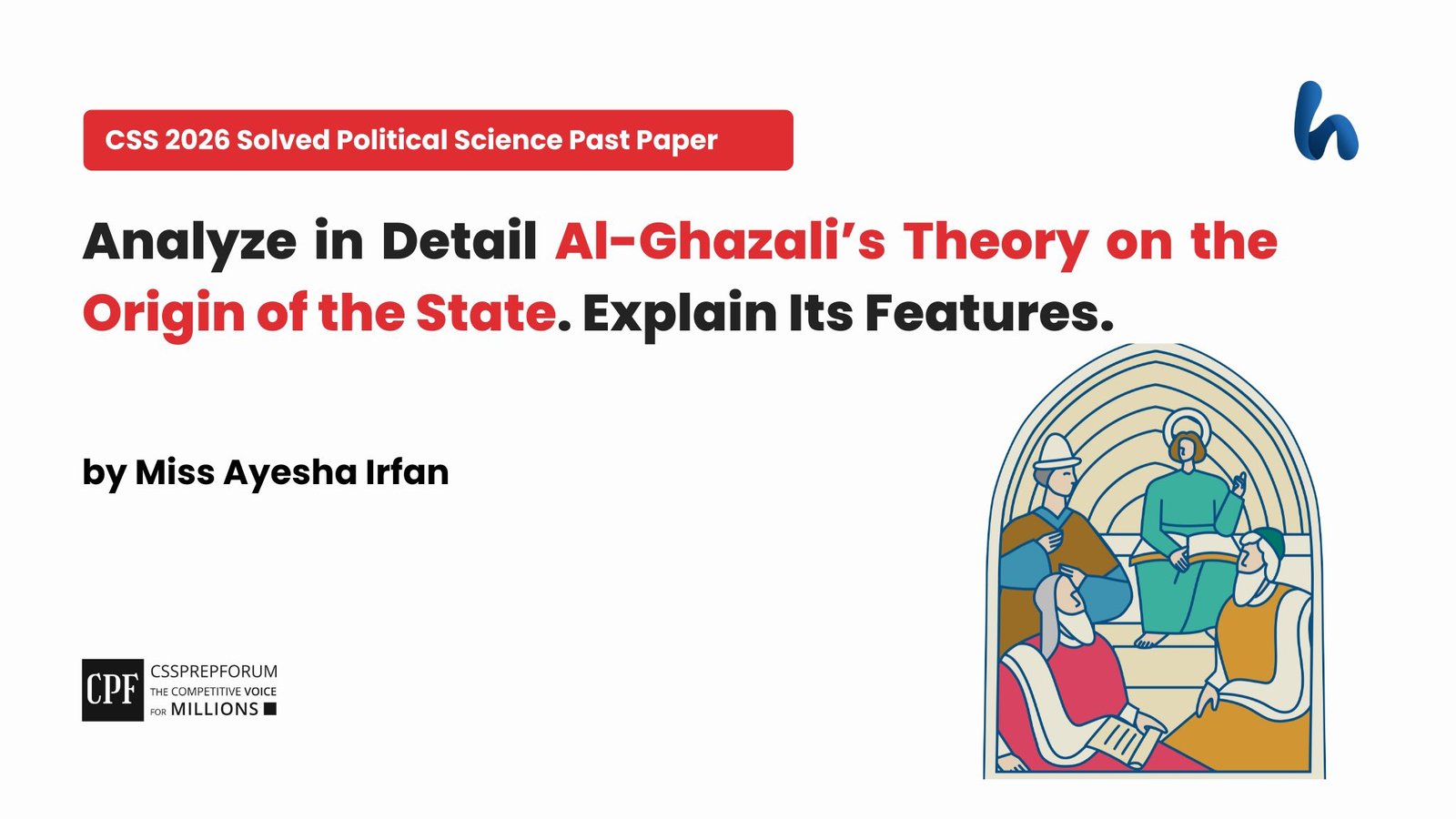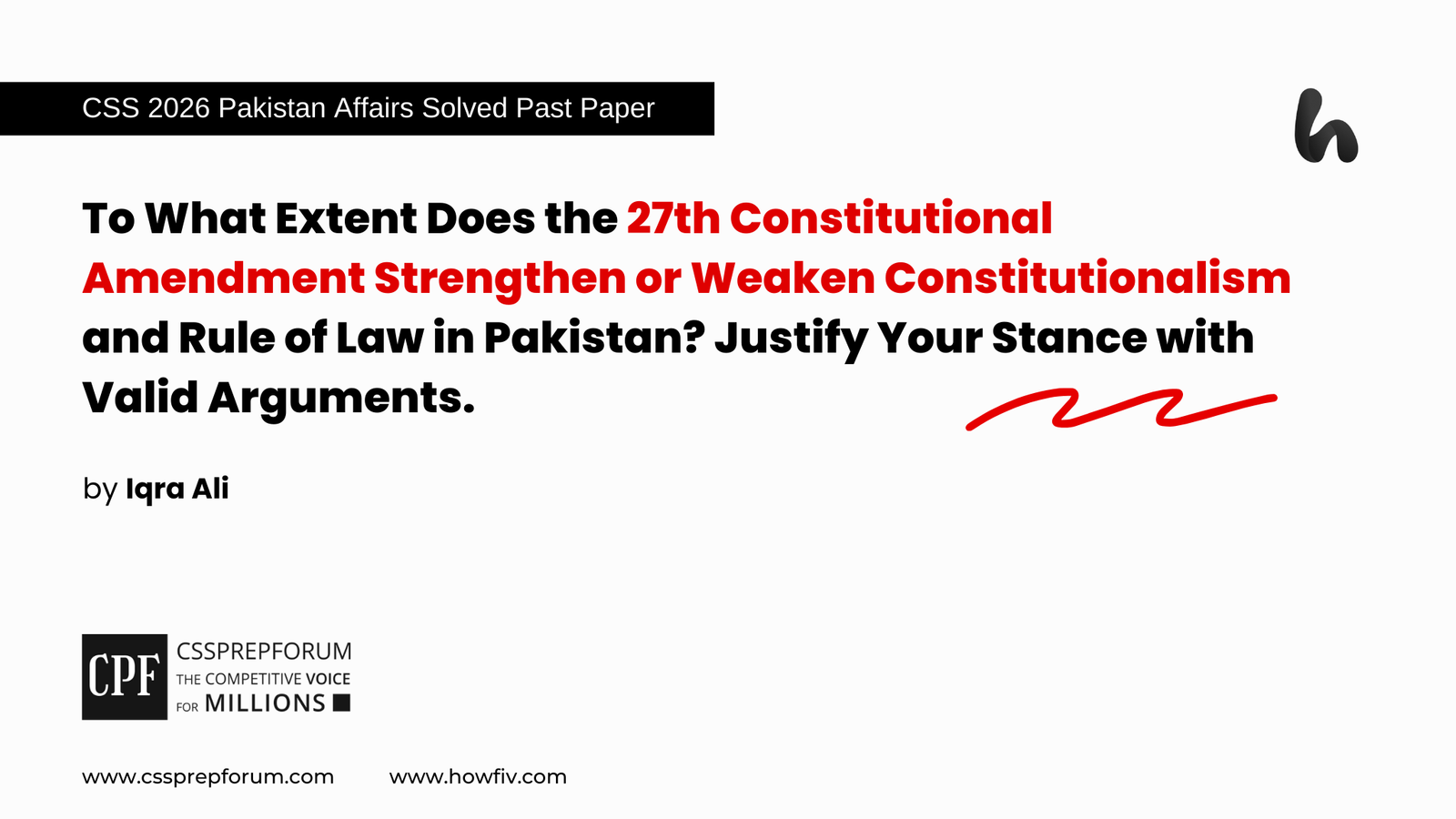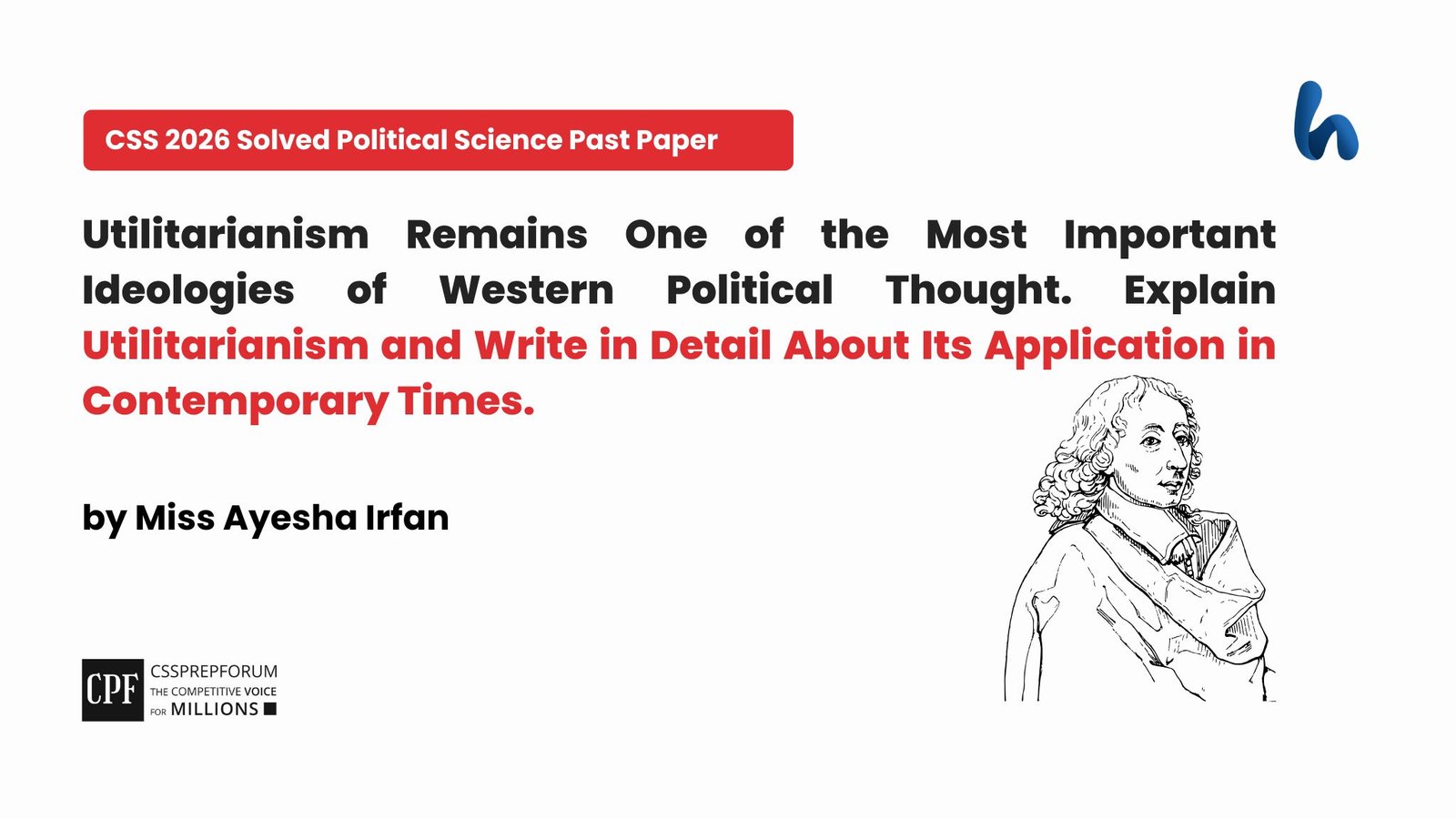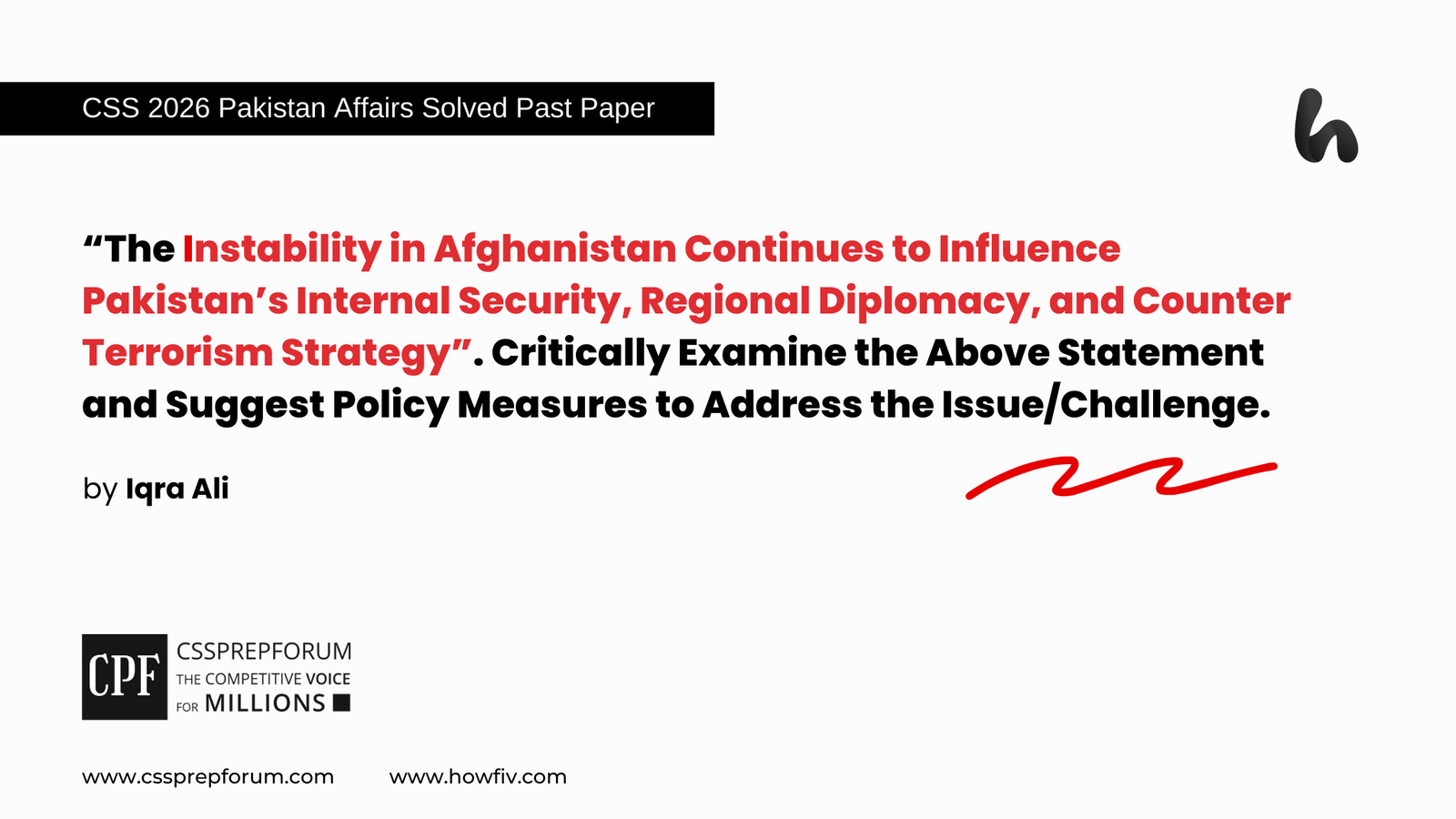CSS Solved Political Science 2024 Past Paper | “Liberty” and “Nationalism“
The following question is attempted by Miss Dr. Shumaila Parveen, the top scorer in CSS Political Science papers. Moreover, the answer is written on the same pattern, taught by Sir to his students, scoring the highest marks in compulsory subjects for years. This solved past paper question is uploaded to help aspirants understand how to crack a topic or question, how to write relevantly, what coherence is, and how to include and connect ideas, opinions, and suggestions to score the maximum.

A-Liberty
Question Breakdown
The examiner has asked the students to write a short note on liberty. Thus, the answer must be terse. The answer starts with an introduction. Afterwards, the students have to provide a brief passage on the origin and meaning of liberty. Then, they talk about the different kinds of liberty, its guardians, and its advantages. Finally, the answer is summed up in concluding remarks.
Outline
1-Introduction
liberty, as Harold Laski said, is the autonomy of people to do any task without any pragmatic restriction, and it is a necessary condition for the satisfaction of people and the growth of the country, which is granted and protected by the law of the land.
2-Diagnosing the term “liberty” and its genesis
- ✓A Latin origin
- ✓Harold Laski’s concept of Liberty
3-Understanding the various genres of liberty
- ✓Natural Liberty
- ✓Civil Liberty
- ✓Constitutional Liberty
- ✓National Liberty
- ✓Political Liberty
4-Who is the guardian of liberty?
- ✓A well-measured democracy
- ✓An independent judiciary
- ✓Constitutional provisions
5-Apprehending the optimism of liberty
6-Conclusion
Answer to the question
1-Introduction
The freedom to do any task, liberty, is a widely debated topic. Though its application is a natural demand, the right kind of liberty must be separated from its evil aspects. One of the prominent protagonists in this area is Harold Laski, who dedicated his book to liberty, presenting its cruciality, understanding its advantages and disadvantages, and apprehending its guardian. Additionally, liberty is subdivided into numerous branches, such as political, civil, constitutional, and natural liberties. Identically, it is protected by multipronged ways, particularly the state constitution, which protects the liberties of its people from all forms of menaces, and, at the same time, the law puts certain restrictions to its arbitrary use, which may harm other fellow citizens or the state’s machinery. To conclude, liberty, as Harold Laski said, is the autonomy of people to do any task without any pragmatic restriction, and it is a necessary condition for the satisfaction of people and the growth of the country, which is granted and protected by the law of the land.
Diagnosing the term “liberty” and its genesis
So, understanding its origin, meaning, and prominent advocators is pertinent before exploring the other aspects of liberty. The word “liberty” originated from the Latin word “Liber”, which means unrestrained. As per its definition, it is a faculty that attains enough freedom to do anything without any source of restriction. However, the deliberation among political philosophers on its pros and cons has proven that liberty is an accessory to doing anything that procures no peril to other individuals, either personal or social. Moreover, in the field of liberty, Harold Laski, one of the most influential advocators of liberty and a par excellence theorist of the 20th century, provided a thorough debate on liberty. He exclusively published a book, Liberty in Modern State, in 1930 on the subject of Liberty. His work opened new dimensions of liberty, making it a revolutionary idea in Political science.
Understanding the various genres of liberty
- Natural Liberty
Moving forward, Natural liberty, a kind of liberty, takes its ground. It is an absolute and unlimited freedom bestowed on men by nature. It is the same freedom that J. J. Rousseau, Thomas Hobbes, and John Locke described in their theory of social contract, which mainly talked about human nature in the state of nature when men were not bound to any social agreement and acted on their impulse and desire uncontrollably.
- Civil Liberty
Next, when men entered the social contract, they were given certain levels of freedom. The societal liberty granted to them by the state is directly opposite to natural liberty. To examine these liberties, we see that they are people’s rights safeguarded by the state’s un-liquified laws and coercive authorities. Such freedom is enjoyed in social settings, either primary, secondary, or tertiary. Additionally, moral liberty also resides in it; moral liberty is the self-determination of an individual to perform independently and learn through his right-minded instinct.
- Constitutional Liberty
Additionally, civil liberty in its domain cradles another type of Liberty, constitutional liberty. As Harold Laski propounds, no liberty is liberty unless it is approved by the body of government and granted by the law. Presently, each polity has thoroughly administered many constitutional liberties for its citizens, for example, the Bill of Rights, fundamental rights, equality before the Constitution, and the rule of law.
- National Liberty
This is colossal jargon with impressive drive and, of course, a prodigious status in the field of liberty. In a plain statement, it is the freedom and independence of a nation from all foreign controls, which is protected through military might or harmonious relationships with neighbouring states. It is necessary to protect all forms of liberties.
- Political Liberty
Similarly, a power given to people in a democratic setup to participate in their political affairs, generate public opinion, and criticize their government’s policies is generally called political liberty. Popular governments are a real-time phenomenon of political liberty.
The guardian of liberty
Besides, the question of the guardians of liberty has been frequently discussed, such as who would protect liberty. And which method would be adopted to protect it? Thus, the following insight satisfies certain ambiguities
- A well-measured democracy
A well-established democracy has many tools to fix every social, economic, and political problem within the state. Democratic tenets, such as the rule of law, separation of power provision, local self-government that ensures the decentralization of power, a healthy political party system, and a free and independent press, if implemented nonchalantly, would surely secure fundamental rights. and liberties of the citizens
- An independent judiciary
The phrase “an independent judiciary” takes its power from a democratic setup where the system of checks and balances and the separation of power plan bestows enough potential to its judicial sector that acts as a bulwark against any attempt to snatch the defined constitutional liberties of the state’s citizens, protecting their liberties through law.
- Constitutional provision
Similarly, the upward statute and its unrestricted implementation grants immense safety to liberty. It is a final authority that uses the agents of social control, particularly penalty, prosecution, and other methods of punishment, to safeguard the liberties of an individual from different individuals and the government.
Apprehending the optimism of liberty
Next, it is argued that liberty has two antagonizing aspects: optimism and pessimism. Overly-provided freedom harbors egocentricity, brutality, and individualism while spoiling the façade of society and, in some cases, harming the country’s political fabric. However, the positive impact of Liberty surpasses its negative retribution. An experienced phenomenon, the development of human personality, could only be possible if humans are given liberty in their personal choices. As Laski aptly said, liberty is an ultimate channel of expression. It helps man build moral adequacy and the capacity to change toward betterment. With an opportunity to grow leisurely, society could take a quick start toward art, science, and technology, promoting the economic and social standards of the country.
Conclusion
In the final statement, liberty is necessary, especially in the present democratic, modern world. Self-liberty or self-determination is taken seriously after the work of Harold Laski, who, by publishing a book on “Liberty in Modern State”, opened a naïve dimension of political philosophy. Before him, political philosophers had taken “liberty”, a demeanour of ignorance. However, man’s instinct drove him to attain many forms of liberties, such as societal, civil, and constitutional liberties. Moreover, this freedom and its limits are well secured by states’ statutes. Thus, employing a task without restriction is called liberty, which takes its vitality through constitutional provisions in a democratic administration. Moreover, multiple liberties are necessary for healthy political, economic, and social systems.

B- Nationalism
Question breakdown
The examiner is required to write a brief note on nationalism. The students should start the answer with an introduction, then write about the genesis of nationalism, the conditions that strengthen it, and the chief impetuses that become its reasons for existence. Finally, give a conclusion.
Outline
1-Introduction
Shared geography, history, religion, and culture synchronize in moulding the contour of the national character, bringing the element of nationalism that binds the people together and compels them to work for their nations’ development and be honest with it. Simultaneously, nationalism procures common enemies and a common government.
2-Deciphering the term “Nationalism”
3-Genesis of nationalism
4-Conditions that make up the creed
- ✓Possession of common territory
- ✓Common sovereign government
- ✓Common hostilities and sorrows
5-Chief impetuses in generating nationalism
- ✓Historical factors
- ✓Political reasons
- ✓Religious elements
- ✓Cultural ingredients
6- Conclusion
Answer to the question
1-Introduction
Nationalism is a sentiment without material existence, yet it realizes huge standing in people’s thoughts and expresses itself in plentiful ways. There are different aspects of nationalism; however, each professes the accord of people having common grounds. Each nationalism, based on its aspirations, history, culture, and religion is a sui genesis, taking its character and form from its context and ambience. Furthermore, considering its origination, it is a European idea of the Middle Ages. Consequently, shared geography, history, religion, and culture synchronize in molding the contour of the national character, bringing the element of nationalism that binds the people together and compels them to work for their nations’ development and be honest to it. Simultaneously, nationalism procures common enemies and a common government.
2-Deciphering the term “Nationalism”
It is a mawkishness, a consciousness, an attraction that binds people together. Moreover, it is a desirous ideology for the people who share common values, culture, religion, land, or state of mind. It’s an instinctive behaviour, and without any logic, the choirs, such as why the people of shared aspirations, creeds, and nationality attract one another, have no space in it because it’s an intuition, not a dialect or rational choice. On the flip side, nationalism draws men of common identities together and expels people of unshared identities apart. The formation of modern-nation states, the territorial boundaries between the countries, and the military tussles among the nations are also the products of nationalism.
Genesis of nationalism
Nationalism is essentially a European idea; however, the term was never meant for a nation. Instead, it was used in European educational institutes during the Middle Ages to identify groups of students of the same nationality. Although before the concept of nationalism, people’s love for their fellow men who shared common ideologies, faith, territory, culture, and aspirations was present, the term “nationalism” is a product of the Middle Ages. In lieu, the word has attained multiple meanings; for instance, the term was used to describe a group of people with something in common, either spiritual, nationality, or material interests. Finally, the concepts of centralism, ethnocentrisms, shared faith, and common ideologies received the term “nationalism”, deeming it an instinct among the people of identical land, faith, and aspirations.

Conditions that make up the creed
In addition, the following elements acquire the spirit of nationalism.
- Possession of common territory
Nationalism takes its stability from shared territory. Once a sense of nationalism arises in the people, attaining separate geographical areas and making their separate homeland is the first idea. The same impetus circulated during the Pakistan movement. The people of the same nationalism demanded the division of India and even sacrificed themselves for their holy cause.
- Common sovereign government
Besides common territory, Nationalism stabilizes itself through the proprietorship of a common government, having a common sovereign, common law, shared economic principles, and a common political scenario. In such a way, nationalism would utilize its potential, stimulating people to increase their skills, personal attributes, a men power to work for the benefit of their state.
- Common hostilities and sorrows
Another creed that builds nationalism is shared hostilities and sorrows. Initially, common enemies led to armaments race, nuclear war, and military expansions to save shared territory, the people, and shared government. Later, this race transformed dichotomously into armed rivalries and technological races. Moreover, freedom is an enchanting feeling that has invoked all struggles against colonialism, whether it is the freedom movement of African nations or the war of independence in Asia.
Chief impetuses in generating nationalism
- Historical factors
Additionally, sharing a common history, common heroes, and mutual historical backgrounds provides stability to nationalism. Even so, the modern secular sciences reject this notion, the theory of common race, but the aspirations of common racial origin led to solidarity among people, as it illustrates the concept of Pan-Africanism, the idea of the holy land of Israel, and the Arab movement.
- Political reasons
Next, this narrative of nationalism will remain a mere talk if not consider the political reasons that fed the nationalism. Political aspirations, particularly the account of representative government, franchise issues, safety of fundamental rights, decentralization of power and authority, generation and division of revenue, attainment of jobs, etc., tend to construct the thought of nationalism. The case study of the formation of Pakistan is an open chapter; political aspirations, combined with other factors, pushed the Muslims of the Sub-continent to attain their separate homeland.
- Religious elements
When nationalism is on the rampage, no semantic defence can hold it. People assume the meaning of nationalism through their religious understanding and sacrifice their lives for the cause. Although the flood of secularism of the twentieth century wiped religious force out of Europe, nationalism remains the course in the Middle East, Asian Subcontinent, and East Asia. The present genocidal war on Gaza is a sheer product of nationalism. Similarly, the formation of Pakistan and India firmly took its ground from a common religion.
- Cultural ingredients
The existence of common moral, social, and economic institutions and ideals also invokes the concept of nationalism. The common societal values affect the rational grounds of its residents. This formidable inspiration has summoned instruments for the struggle of a separate nation, giving rise to radicalism, socialism, capitalism, revolutions, etc.

Epilogue
In conclusion, nationalism is a sentiment that cannot be proved logically, yet it bounds individuals into its spells and makes them die for its cause. The elements, such as love for the compatriots, shared political vision, common historical background, common hostilities, and shared aspirations, attracted people towards nationalism. Moreover, it is an igniting institution that tends to realize itself through the territory and also becomes the most imperative stimulus to start revolutionary wars or the war of independence. Meanwhile, as history explained, it depends on common territory, joint government, and diverse cultures. Hence, nationalism is a feeling promoted through shared values, material and non-material; it varies from nation to nation based on its context and environment and obliges people to strive for its cause.

CSS Solved Past Papers’ Essays
Looking for the last ten years of CSS and PMS Solved Essays and want to know how Sir Kazim’s students write and score the highest marks in the essays’ papers? Then, click on the CSS Solved Essays to start reading them.
CSS Solved Essays

CSS Solved General Science & Ability Past Papers
Want to read the last ten years’ General Science & Ability Solved Past Papers to learn how to attempt them and to score high? Let’s click on the link below to read them all freely. All past papers have been solved by Miss Iqra Ali & Dr Nishat Baloch, Pakistan’s top CSS GSA coach having the highest score of their students.
General Science & Ability Solved Past Papers
CSS Solved Pakistan Affairs Past Papers
Want to read CSS Pakistan Affairs Solved Past Papers and learn how to attempt them to score high? Let’s click on the link below to read them all freely. All past papers’ questions have been attempted by Sir Kazim’s students, who scored the highest in the subject.
CSS Solved Pakistan Affairs
CSS Solved International Relations’ Past Papers
Have you opted for International Relations in the CSS examination and want to score above 150? Then, click on the CSS Solved International Relations’ Past Papers by Miss Abeera Fatima, the top IR scorer and the best IR coach in Pakistan.
CSS Solved International Relations Past Papers


